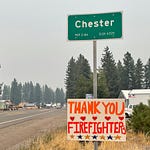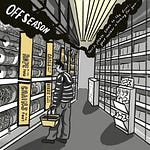We weren’t on a fire or hiking up gnarly hills that day. We all yawned on the 45-minute drive to a project site. It was still early days in the Southern California fire season, while Northern California was already popping off. The day wasn’t special in any way. The Santa Ana winds hadn’t started yet, and there wasn’t much patrolling to do. All we could do was train, check the weather, tackle project work, and hope to get dispatched on a rainbow strike team to make the long drive up north.
We spent the day lollipopping trees—trimming their lower branches—and chaining what we cut down to the chipper stationed a little ways off. I loved this kind of work. You’d chat with the person beside you as you chucked severed limbs into the chipper’s clanking metal mouth, a mouth that would gladly take your limbs if you weren’t careful. It all felt funny to me. Passersby would wave happily, calling out, “Oh look, honey, firefighters! Why are they wearing yellow? Why aren’t their trucks red? Isn’t there a fire near Redding they should be at?” I’d laugh to myself, mimicking what I imagined they said as they drove past.
“We’re fireless firefighters,” Rick, a friend I’d started with at the department, would joke. He’d later move on to a busy hand crew not far away, chasing the fires we’d missed that first season.
As the afternoon wore on, we were told to find shade and take lunch. We all bunched together under what little shade we could find, eating whatever food we’d left warming on the truck dashes. The first few minutes were silent as we devoured our meals. I looked around at everyone, each absorbed in their own thoughts. In that moment of silence, I felt accepted. It’s hard to describe. I never wanted to be a leader or someone who held the crew back. I wasn’t striving for mediocrity either—I pushed myself on every run, every hike, every day. But sitting there, I felt like I’d earned my place on this crew, and that meant everything to me.
“Did you bring lunch?” Anthony, a seasoned firefighter and now a Cal Fire crew member, asked one of the new guys.
“Forgot. I know, I know,” the rookie replied, prompting groans and playful jeers from the group as we dug through our lunch bags.
“No, seriously, I’m fine,” the unprepared rookie tried to protest, but it was no use. A granola bar flew past my ear, followed by an apple, a bag of chips, and a handful of other snacks. I tossed over a bag of M&Ms as the barrage continued.
Thanks for reading Robo’s Substack! Subscribe for free to receive new posts and support my work.
“Shut up.”
“Just eat, idiot.”
“You’re lucky I’m generous,” someone grumbled, joking through their feigned annoyance. Despite their teasing, no one hesitated to share what little they had to make sure the rookie was okay.
“Thanks, guys. I really appreciate it,” the rookie muttered, sheepishly waving at the group.
“Use your head next time, you stupid fuck,” I said with a grin.
In that moment, I was reminded of a story I’d heard in a wildland fire class years earlier. A seasoned chief had come by to give us a pep talk, preparing us for the academy and the career ahead. He shared his resume, the importance of training, and always being a student of fire. But one thing stuck with me:
“You’re going to be miserable. I’ve been miserable on fires, stuck with people I disliked for 14- or 21-day stretches. But you’ll suffer alongside them, share in the pain, and build a bond that makes you want to help each other. I’ve shared tins of tuna with people, not because I had to, but because I wanted them to be okay.”
We weren’t on a fire that day. We weren’t suffering. But as granola bars and snacks rained down on the rookie, I felt the truth of those words. After years of bitterness with life, I found peace in moments like these, where my faith in humanity was restored. It wasn’t about giving someone food; it was the instinctive, unspoken care we had for each other that meant everything.
Weeks later, near the end of a shift, one of the rookies mentioned his family was visiting the station for a tour. After jokingly mocking him for having a loving family, we promised to be on our best behavior. As his family arrived, we watched from a distance.
“He has a brother?” I asked Young as we lounged on the log bench outside the bunkroom.
“Looks like his mom and dad came too,” Young replied. We gave the rookie a hard time, but we respected him. He was smart, capable—just clumsy at times, as rookies often are.
When they came to the bunkroom, the rookie introduced us to his family. After the usual pleasantries, something struck me. His father, instead of sharing pride in his son, made a dismissive remark comparing him to his brother. “He’s the idiot of the family,” he said, laughing as if it were a joke. But there was no humor in his voice.
Young and I exchanged a glance. “What the fuck was that?”
“I know. That was fucking weird,” Young muttered. “His dad’s a dick.”
“Yeah, who says that about their own kid?”
From that moment, we stopped teasing the rookie and started watching out for him more. If he got ragged on at home, it wasn’t going to happen at work—not on our watch.
Years later, on a call with a friend, we reminisced about those days. “Everyone’s gone now,” he said. “I know it’s lame, but I wish I realized those were the good old days when we were living them.”
“I miss them too,” I replied.
These words may not mean much to the outside world. They may be imperfect, misspelled, or poorly punctuated. The conversations we had on dirt mounds in summer may fade. The words I write aren’t poetry but the people I worked beside—they truly were.
You are one of us; I was once one of you. Together, we stood in this place, bound by loyalty and dirt.
Written by Brandon “Robo” Robles














Share this post